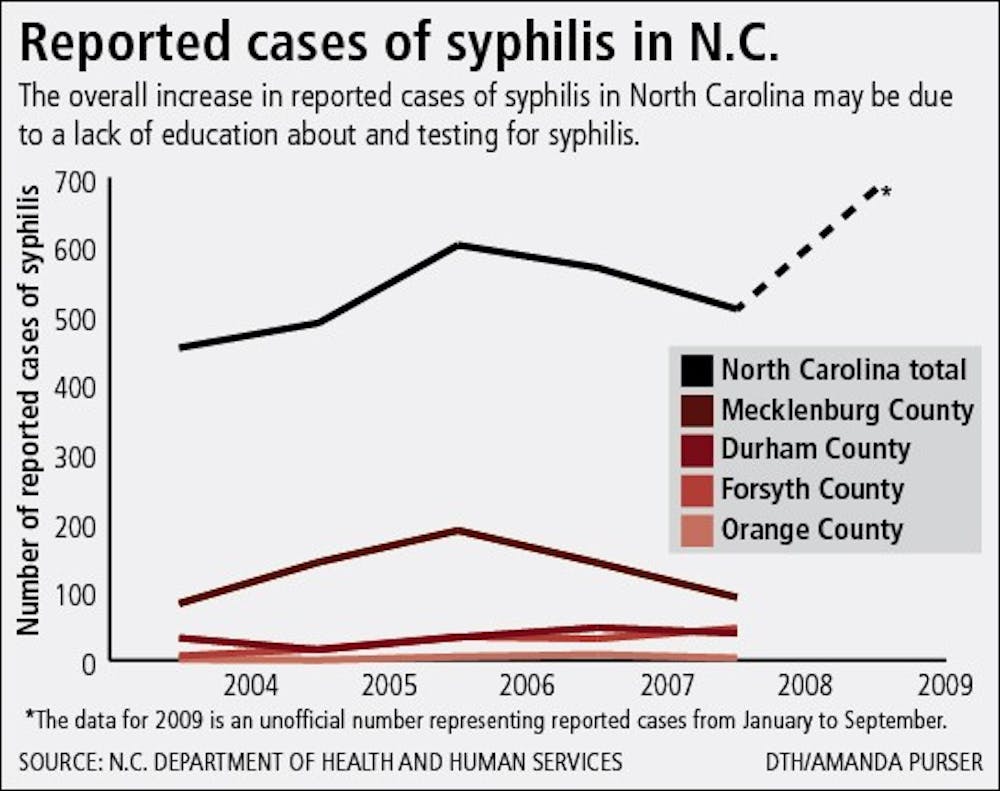A lack of funding for prevention has prompted a rapid rise in North Carolina’s syphilis cases.
Rates have nearly doubled in the past year — a 90 percent increase from September 2008 to September 2009. There were 684 reported cases of syphilis from January 2009 to September 2009.
Rates remained steady or even declined for several years before.
How to recognize and treat syphilis
Transmission:
-Contact with a syphilis sore, which mainly emerges in the genital area
Primary stage:
-Single sore will appear between 10 and 90 days of contracting syphilis. Multiple sores sometimes appear.
-Sores are small, round and painless and heal within 3 to 6 weeks.Secondary stage:
-Non-itchy rash (typically on palms of hands and soles of feet) on one or more areas of the body that appears as or after the sores heal.
-May include fever, swollen lymph nodes, sore throat, patchy hair loss, headaches, weight loss, muscle aches and fatigue.Later, dormant stages:
-Begins when primary and secondary symptoms disappear, can last for years or emerge years after infection
-Develops in about 15 percent of people who do not treat syphilis at earlier stages.
-May damage internal organs.
-Signs include difficulty with muscle coordination, paralysis, numbness, gradual blindness and dementia
-Can cause death in extreme casesTreatment:
-Can be treated in the primary and secondary states.
-If infected for less than a year, one penicillin injection is adequate. Additional doses are needed if infected for longer.
-Treatment will stop further damage to the body, but cannot reverse
damage already done or prevent people from contracting syphilis again.Prevention:
-Abstinence
-Monogamous relationships
-Condoms (not 100 percent effective)
The disease has reappeared in Forsyth County, which eliminated it in 2005, and rates are rising in Wake and Mecklenburg counties as well.
“We’re one of the few states in the nation where that still happens,” said Jan Scott, a public health advisor at the N.C. Division of Public Health. “There’s just no reason for this to continue.”
Evelyn Foust, the director of the communicable diseases branch in the N.C. Division of Health and Human Services, blames the increase mostly on funding cuts from the state and the Centers for Disease Control and Prevention.
“We had an opportunity to keep it down in the South and I believe that was a missed opportunity,” Foust said. “Congress has to increase funding for HIV and STD prevention, and that funding needs to be targeted to the South.”
The national Syphilis Elimination Effort funded prevention and awareness campaigns in North Carolina in the late 1990s, when five counties were among the nation’s 28 most affected areas, Foust said.
Numbers in the South have always been higher than the national average, said Bill Jones, an epidemiologist with the communicable diseases branch of the Division of Public Health.
“The South does have high rates of poverty. … You can see lots of corollaries,” he said.
But when the number of cases dropped, CDC restructured its funding, redistributing it away from North Carolina in 2007.
“When the numbers started going up last September, there was no money,” Scott said. “We won’t see funding for those programs until next year, which is really behind the curve.”
The prevention and awareness programs that haven’t been cut are functioning with 74 percent less funding, Foust said.
“Most of the cuts were made in the very counties that have resurgences of syphilis today,” Foust said. “Because it’s so infectious, it’s simply spreading across the state.”
Syphilis is easy to test. All it takes is a simple blood test, the same one used for HIV/AIDS. There also is an easy cure. The treatment, if the case is caught early, is a single penicillin injection, Foust said.
Aside from its own consequences, syphilis is also troubling because it increases people’s risk for HIV/AIDS, she said.
Prevention and awareness programs and testing target high-risk populations. Instances are highest among gay men, especially within the black and Latino populations, Scott said.
“Your sexual orientation is not a barrier to your getting the disease. These are equal opportunity diseases,” Foust said.
Project STAND offers syphilis education and testing in Durham County jails, state and federal prisons, homeless shelters and the community at large.
There are also statewide programs such as RIOT — Rapid Intervention Outreach Team — which organizes door-to-door free testing for HIV and syphilis.
Most of the funding for syphilis elimination efforts goes toward personnel costs, said Tekola Fisseha, the director for health education at the Durham County Public Health Department.
The rest, which is minimal, goes toward education and testing.
Funding cuts have led to the elimination of most of the personnel supporting prevention and awareness campaigns, Foust said.
Durham County has found low-cost options for getting the word out. Selena Monk, a project coordinator at the Durham County Division of Health Education, created a Facebook page to raise awareness that has accrued more than 500 fans. She also initiated a texting service for people with questions.
Durham County has kept its syphilis rates low compared to other counties, but Foust said that may not last.
“This may start in one community, but if not rapidly attended to, it can spread out of that community.”
Contact the State & National Editor at stntdesk@unc.edu.



